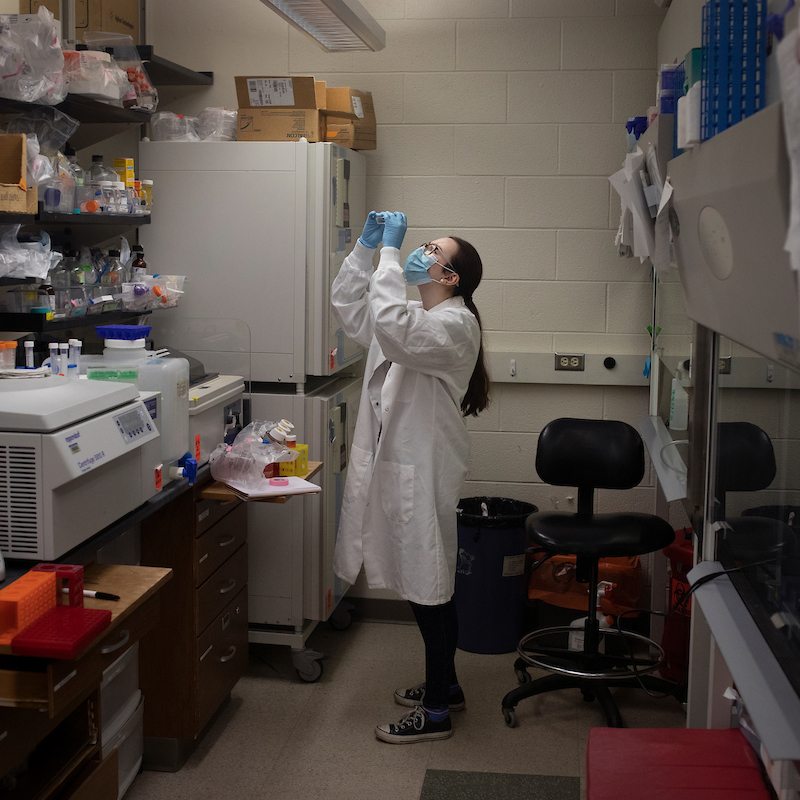Filing flora
More than 800,000 rare, extinct and native flora have been preserved by the North Carolina Botanical Garden’s Herbarium, where biodiversity is found in every filing cabinet.
At Carolina, we’re tackling tough challenges and accelerating new discoveries and solutions to emerging challenges through multidisciplinary teams of top scientists and students.
Tar Heels are finding cures and treatments for diseases, creating technologies and launching new industries to improve the lives of North Carolinians and people around the world. A billion-dollar venture, research at Carolina has quadrupled over the past 15 years, firmly establishing UNC-Chapel Hill as one of America’s top-ranked research universities.
Carolina will recognize the remarkable research achievements of our students, faculty and staff with the annual University Research Week from Oct. 10 to 14, including highlighting the impact of research throughout our history during University Day on Oct 12.
University Research Week is a celebration of research excellence, displaying the scope of work conducted by Tar Heels across many disciplines and inspiring students to participate in research activity. This year’s event will focus on the theme of “What’s Next?,” highlighting how Carolina researchers are motivated to explore, innovate and discover answers that help the citizens of our state.

University Research Week will feature more than 60 events designed to inspire, inform and educate the Carolina community. With presentations, workshops and lectures, the week will showcase the breadth of research conducted by our world-renowned faculty and students.

More than 800,000 rare, extinct and native flora have been preserved by the North Carolina Botanical Garden’s Herbarium, where biodiversity is found in every filing cabinet.
Through the UNC Institute for the Environment's semester-long Sustainable Triangle Field Site, Carolina students are researching Chapel Hill's creeks to help the town develop stronger flood mitigation plans.
Researchers at the UNC Gillings School of Global Public Health are developing filters to remove toxic chemicals from drinking water, revealing the harmful side effects of e-cigarettes, studying the long-term effects of injury and violence, creating interdisciplinary teams to research and understand obesity, improving access to treatments for opioid use disorder, addressing cancer prevention and control — and so much more.
As a result of systemic oppression, there are fewer than 200 native Cherokee speakers in North Carolina. To keep the language alive and pass it to the next generation, UNC-Chapel Hill researcher and Eastern Band Cherokeean citizen Benjamin Frey has teamed up with computer scientists Mohit Bansal and Shiyue Zhang to create a new translation model and grow the literary library of works available in Cherokee.
Associate Professor Kara Hume coaches Power Hour, a fully inclusive adaptive fitness class for young adults with autism and other developmental disabilities. A new fund for faculty in the UNC School of Education is empowering Hume to pilot a study to examine the social and health impacts of Power Hour.
Madison Milotte used a Summer Undergraduate Research Fellowship to study how increasing temperatures affect the pupation of cabbage white butterflies.
More than a dozen of Tar Heels are working to bring the wonders of science to children in the community through the graduate student-run organization Science in the Stacks. The group partners with North Carolina libraries to teach science lessons through a mix of in-person and virtual demonstrations.
The Scientific Research and Education Network connects educators and researchers to enhance STEM learning in classrooms across the state. Through the program, better known as SciREN, graduate students work with K-12 teachers to design easy-to-use school lesson plans on their own research that teachers can bring to their students.
GSK Science in the Summer — a partnership between Carolina’s Morehead Planetarium and Science Center and health care company GlaxoSmithKline — offers free science programs to elementary and middle school-aged students in 11 counties across our state.